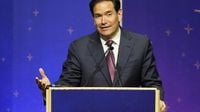On Wednesday, June 11, 2025, President Donald Trump confirmed that the United States is in the process of relocating personnel from parts of the Middle East amid escalating tensions involving Iran and Israel. Speaking at the Kennedy Center, Trump described the region as potentially "dangerous," emphasizing the administration's commitment to safeguarding American lives. "They are being moved out because it could be a dangerous place, and we'll see what happens. We've given notice to move out," he said.
The U.S. State Department ordered the departure of all nonessential staff from its embassy in Baghdad, Iraq, citing increased security risks. This move affects only a limited number of personnel since the embassy was already operating with reduced staffing. Beyond Iraq, the department authorized the voluntary departure of nonessential personnel and their families from Bahrain and Kuwait, offering government assistance and covering expenses for those who choose to leave. Additionally, the U.S. consulate in Erbil, located in Iraqi Kurdistan, is also preparing for a similar reduction in staff.
Defense Secretary Pete Hegseth has authorized the voluntary departure of military dependents from various locations across the Middle East. U.S. Central Command (CENTCOM) is closely monitoring the developing tensions, underscoring the seriousness of the situation. General Michael Kurilla, CENTCOM's commander, was scheduled to testify before the Senate Armed Services Committee on June 12 but postponed his appearance, a move attributed to the escalating regional instability.
Despite these precautionary measures, Iraqi officials have downplayed the security concerns within their borders. The Iraqi News Agency quoted an unnamed government official stating that the personnel movements are part of broader procedures related to the U.S. diplomatic presence across multiple Middle Eastern countries, not solely Iraq. The official added, "We reiterate that all security indicators and briefings support the escalating assessments of stability and the restoration of internal security."
The backdrop to these developments is the faltering nuclear negotiations between the United States and Iran. Since April 2025, the two sides have engaged in five rounds of talks aiming to limit Tehran's nuclear program in exchange for lifting some economic sanctions. However, the talks have hit significant roadblocks, with the sixth round—tentatively scheduled for mid-June in Oman—looking increasingly unlikely.
President Trump expressed diminishing confidence in reaching a deal, telling the New York Post's "Pod Force One" podcast that he was "getting more and more less confident about it." He accused Iran of delaying the process, stating, "Something happened to them, but I am much less confident of a deal being made." Trump reiterated his firm stance that Iran "can't have a nuclear weapon," emphasizing, "We're not going to allow that."
Meanwhile, Iran's mission to the United Nations countered U.S. assertions on social media, asserting, "Threats of overwhelming force won’t change the facts. Iran is not seeking a nuclear weapon, and U.S. militarism only fuels instability." Iranian Defense Minister Brigadier General Aziz Nasirzadeh echoed a defiant tone during a press briefing on June 11, warning that should conflict be imposed, "the opponent’s casualties will certainly be more than ours." He further declared, "America must leave the region, because all its bases are within our reach. We have access to them, and we will target all of them in the host countries without hesitation."
These remarks come amid heightened fears of military confrontation. Last month, U.S. intelligence indicated that Israel was preparing for potential strikes against Iranian nuclear facilities, observing movements of air munitions and the completion of air exercises. CNN reported that President Trump had urged Israeli Prime Minister Benjamin Netanyahu to hold off on such actions during a phone call on June 9, describing the conversation as "very well, very smooth." Nonetheless, internal disagreements within the U.S. government persist regarding the likelihood of an Israeli attack.
The International Atomic Energy Agency's Board of Governors was poised to vote on a measure potentially censuring Iran, which could trigger the reinstatement of United Nations sanctions under the 2015 nuclear deal framework—an agreement the U.S. withdrew from during Trump's first term. Iran currently enriches uranium to 60 percent, a significant increase from the 3.67 percent limit set by the 2015 accord and approaching the 90 percent threshold necessary for weapons-grade material. Iran's Supreme Leader, Ayatollah Ali Khamenei, recently reaffirmed that uranium enrichment is "key" to Iran's nuclear program and asserted that Washington "cannot have a say" on the matter.
Amid these tensions, the United Kingdom Maritime Trade Operations center, overseen by the British navy, issued a warning to vessels transiting the Persian Gulf, Gulf of Oman, and Strait of Hormuz. The advisory cautioned mariners about the potential for escalated military activity that could directly impact shipping in these vital waterways, though it did not explicitly name Iran.
The United States maintains multiple military bases throughout the Middle East, with the largest located in Qatar. The region has witnessed significant conflict in recent years; notably, in January 2020, Iran launched missile strikes against bases in Iraq housing American troops in retaliation for the U.S. killing of Iranian General Qassem Soleimani. These attacks resulted in dozens of U.S. soldiers suffering traumatic brain injuries.
U.S. Special Envoy Steve Witkoff is scheduled to meet Iranian Foreign Minister Abbas Araghchi in Oman on June 15 to discuss Iran's response to a recent American proposal for a nuclear deal. However, Iran has criticized the latest draft for failing to provide adequate relief from sanctions, a critical demand given the severe economic pressures Tehran faces.
President Trump, since resuming office in January 2025, has pursued a "maximum pressure" campaign against Iran, combining diplomatic efforts with warnings of military action if negotiations fail. His administration's cautious drawdown of personnel in the Middle East reflects the precarious balance between diplomacy and the looming threat of conflict.
In sum, the U.S. is actively reducing its diplomatic and military footprint in key Middle Eastern locations as tensions with Iran escalate over nuclear ambitions. While diplomatic channels remain open, the situation remains volatile, with both sides issuing stern warnings and military posturing intensifying. The coming weeks will be critical in determining whether diplomacy can prevail or if the region edges closer to open conflict.




